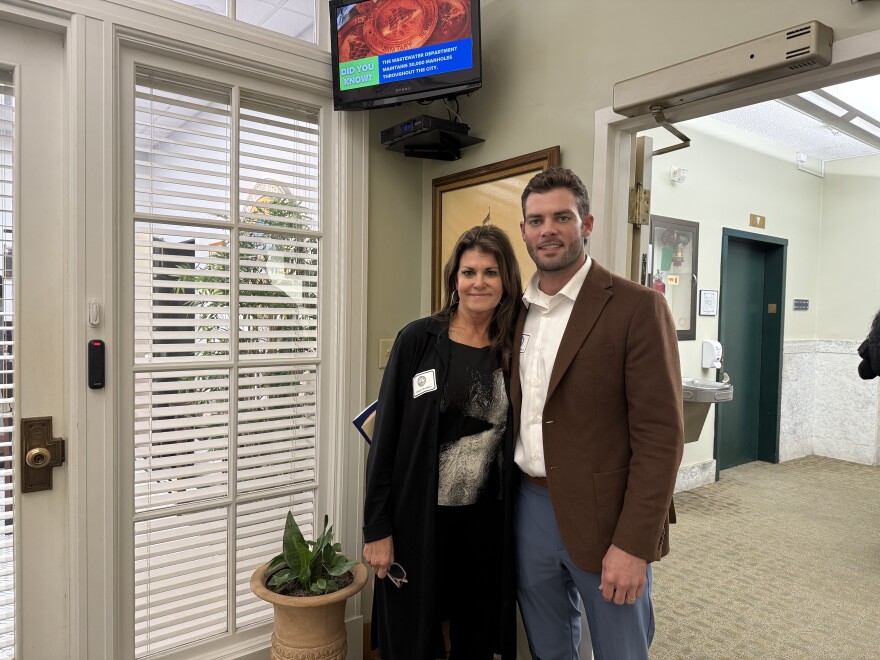Cynthia Clonts and her son Parker, are bringing change to the Grant Park neighborhood in East Tampa with help from the city.
“We’re not major developers. We’re not major investors. We’re legacy owners of over 20 years,” Cynthia Clonts said.
In a 4-0 vote on Nov. 13, the Tampa Community Redevelopment Agency (CRA) Board approved a $1.8 million subsidy for Clonts Properties to build affordable apartments on a vacant lot they’ve owned for decades.
Councilmembers Miranda, Viera and Clendenin were absent for the vote.
“I’m going to support this. I’m excited to support this,” Councilmember Guido Maniscalco said. “This is a worthy investment for something that we absolutely need.”
The project will draw funds from the East Tampa Community Redevelopment Area (CRA), one of several financing districts where property tax revenues are reinvested within the same neighborhoods.
In the East Tampa CRA, projects must have a goal of improving infrastructure and opportunities in the area.
The Clonts Properties’ project promises to build 12 apartments that are affordable for households earning less than 80% of the area median income, or a family of four earning about $83,000 a year in Hillsborough County. The CRA developer subsidy also requires the units to stay affordable for at least fifty years.
A 'homegrown' project
Speaking ahead of the Tampa CRA board vote, Debra Cammiliss, a longtime pastor in the Grant Park neighborhood, said these dollars would be well spent on building affordable housing.
“They are people that have a heart. They're developers, not with a money sign in their eyes, but they're there to make a difference in our community,” she said.
She was one of seven residents and community advocates to speak in favor of the Grant Park project.

Be Parks, the CRA community development coordinator, called the proposal a "homegrown project" during an August meeting of the East Tampa Community Advisory Council (CAC).
This group, which meets to discuss how East Tampa CRA dollars are spent, recommended that the Clonts Properties' affordable housing project be granted $2.5 million.
ALSO READ: Can 'granny flats' fix Florida's affordable housing crisis? Local experts weigh in
Despite the recommendation, the CRA board approved $1.8 million for the project on Nov. 13.
This comes amid criticism from community members and CAC members about how East Tampa CRA dollars are doled out.
Dispute over East Tampa CRA dollars
Alison Hewitt, a longtime resident and business owner, has been a proponent for more equitable development in Tampa.
Speaking during public comment, she said she would like to see the CRA board further standardize the application process for developer subsidies.
"I support this project ... but [what] we need is fair treatment of the grant policies across the board," Hewitt said.
She pointed to another line item that was funded on Nov. 13, $5 million awarded to the CDC of Tampa for affordable housing in Heritage Heights; she said it was slow-rolled in comparison to the Clonts Properties' project.
There's also been criticism that the current CRA funding process favors larger developers over legacy owners building on smaller lots, like Clonts Properties, Inc.
Tampa realtor Kella McCaskill said she's also been disillusioned with the process of applying for East Tampa CRA dollars.
"I've done a lot of things as it relates to real estate, banking, lending, the whole nine, but when I got to this piece, I was stumped when it comes to this process," she said.
On Nov. 13, the Tampa CRA board also approved some changes to policies and guidelines regarding commercial grants, including the application process.
The board is also updating the community development plan for the East Tampa CRA, which is approaching the end of its funding timeline in the spring.
Gabriella Paul covers the stories of people living paycheck to paycheck in the greater Tampa Bay region for WUSF. Here’s how you can share your story with her.







